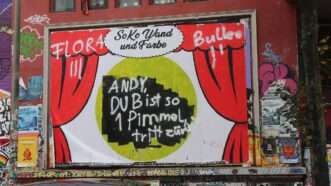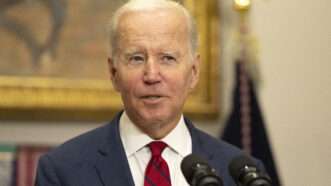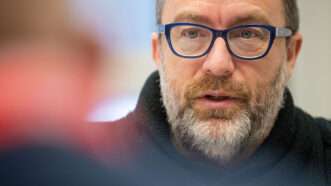Free Speech
Professor's Prior Restraint Lawsuit Against Collin College Can Go Forward
The professor, Joseph Michael Phillips, had spoken about Confederate memorials, race relations, a shooting, and masks.
YouTube Says Giorgia Meloni Video Was Removed in Error, Restores It After Inquiry
"Upon careful review, we determined this video is not violative of our Community Guidelines and have reinstated it," said a YouTube spokesperson.
A Parodist Asks SCOTUS To Let Him Sue the Cops Who Arrested Him for Making Fun of Them
The 6th Circuit ruled that qualified immunity prevented Anthony Novak from vindicating his First Amendment rights.
"One of the Side Effects of COVID-19 Is Litigation"; and in Litigation, as in Medicine, Delay Can Be Deadly
An appeal a day late (even if not a dollar short). [UPDATE: But there may be a lifesaving treatment!]
The University of Idaho General Counsel's Letter on Abortion
Justice Scalia, to the rescue.
The University of Idaho General Counsel's Letter on Contraceptives
I think the letter's analysis as to contraceptives is inconsistent with the statutes, and with a binding Supreme Court precedent.
For Florida Gov. Ron DeSantis, Political Stunts Are More Important Than Substance
Who cares if it’s legal if it generates politically advantageous outrage and attention?
Subreddit Gets Users To Call Texas Gov. Greg Abbott a 'Little Piss Baby' To Defy Content Moderation Law
Reddit users are protesting Texas' H.B. 20, which forces social media platforms to host speech they find objectionable.
In Purported Global First, Dutch City Bans Meat Ads
Haarlem lawmakers claim the ban will help fight climate change.
Germany's Criminalization of Online Offensiveness Shows the Perils of Weakening the First Amendment
A crackdown on insults, hate speech, and misinformation punishes dissenters who express themselves in ways that offend government officials.
First Amendment Limits on State Laws Targeting Election Misinformation, Part V
The need for a comprehensive strategy addressing election misinformation.
Packingham Jr.: Louisiana Court Upholds Ban on Certain Sex Offenders Using Many Social Media Sites
The relative narrowness of the law, the court concludes, distinguishes the law from the one struck down in Packingham v. North Carolina.
Biden-Backed DISCLOSE Act Would Dox Donors to Groups That Run Political Ads
Plus: Student drag shows are protected speech, a bank CEO rebuffs Rep. Rashida Tlaib, and more...
First Amendment Limits on State Laws Targeting Election Misinformation, Part IV
First Amendment implications for state laws targeting election speech.
Tennessee Tech Punishes Student Groups Who Hosted Drag Performances
Even though it might cause pearl-clutching, there is nothing obscene about drag shows.
First Amendment Limits on State Laws Targeting Election Misinformation, Part III
A First Amendment framework for analyzing restrictions on election-related speech.
The Government Can't Fix Social Media Moderation and Should Not Try
Democrats and Republicans both demand solutions that are inconsistent with the First Amendment.
First Amendment Limits on State Laws Targeting Election Misinformation, Part II
An overview of state efforts to combat election misinformation.
First Amendment Limits on State Laws Targeting Election Misinformation, Part I
Although the federal government has largely stayed out of regulating the content of election-related speech, the states have been surprisingly active in passing laws that prohibit false statements associated with elections.
What Wikipedia Can Teach the Rest of the Internet
Jimmy Wales talks about why his online encyclopedia works, how to improve social media, and why Section 230 isn't the real problem with the internet.
British Cops Arrest and Threaten Anti-Monarchist Protesters
Anti-royalists are facing fines and jail sentences for disrupting ceremonial events
There's No Way FOSTA Isn't a First Amendment Violation, Says Lawsuit
The case is now on appeal after a lower court said the ban on websites promoting prostitution didn't concern protected speech.
Draft Motion to Get Access to an Interesting (but Sealed) Appellant's Brief in a First Amendment Case
Should an appellate court provisionally seal a brief until the case is heard on the merits? Or should it try to make a redacted version promptly available?
Biden's Sneaky Censors
Behind the scenes, federal officials pressure social media platforms to suppress disfavored speech.














